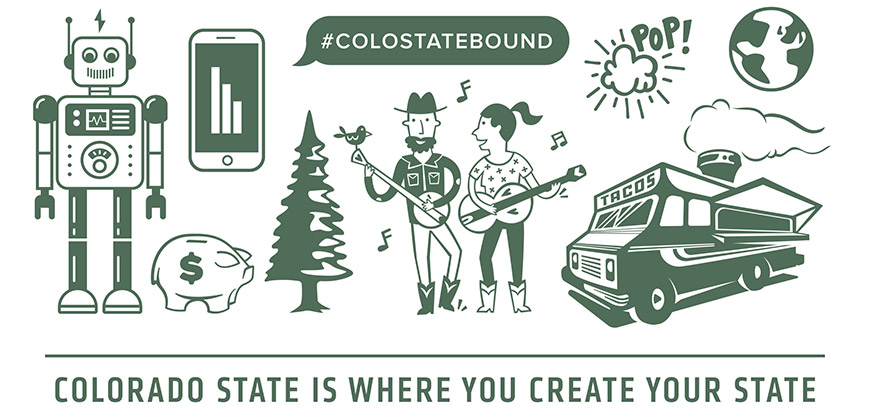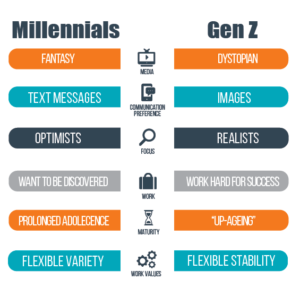
A page from an admissions marketing piece.
Baby Boomers, Generation X, Millennials – they’re names for generations of Americans who share common worldviews, traits and behaviors. The youngest named generation in our society, known as Generation Z, has reached college age, and incoming freshmen fall squarely within this fast-growing group.
Who is Gen Z, and how does Colorado State University recruit, welcome and support these students? In a myriad of ways, it turns out – from admissions marketing teams seeking to grab their attention in the first place, to career counselors helping them find their passion, and their future.

Summer Shaffer is associate director of communications, outreach and technology at the CSU Career Center. For her master’s in organizational leadership, she focused on generational studies and their impacts on the workplace. As a career services leader, she frames her own communication style and sensibilities in the context of her audience, which includes Millennials and Gen Zers.
So-called generational studies – the discipline of defining, analyzing and understanding generational trends – are in no way a means of establishing an individual relationship. Far from it.
“Just because I know what generation you’re a part of doesn’t mean I know everything about you,” Shaffer says. “But for a broad audience, such as an incoming class, it’s a way to notice traits and trends and commonalities, and to prepare ourselves as a welcoming campus. That’s the right way to look at generational studies – not as an individual management tool.”
According to a majority of experts, Gen Z starts with people born in about 1996 – roughly the 21-and-younger set of today. The leading edge of Gen Z bleeds into the trailing edge of Millennials, the second-youngest generation, who currently make up the largest percentage of the nation’s workforce.
Some things you might not know about Gen Z, according to Shaffer and other experts:
The recession and its impact
Generational scholars often group people by major historical events that occur during a person’s formative years – roughly toddler age through middle school. Gen Zers were children during the economic recession of 2007-09. During their formative years, they witnessed their families losing their jobs, houses and livelihoods.
They’re authentic realists
As such, Gen Zers tend to be more pessimistic – and realistic – than their older counterparts. Adding to this tendency is that Gen Zers have always known the U.S. to be engaged in international war and conflict. These students value transparency and authenticity.
Massive debt? No thanks
Gen Zers have watched their older compatriots go into massive debt to finance their educations – and most Gen Zers aren’t interested in following suit. As college students, they tend to be entrepreneurial, and they craft their majors to fit their career goals (not the other way around).
‘Snack-size’ education
Digital and mobile technology is not just part of their world – it IS their world. Gen Zers are true digital natives. They’re also accustomed to what experts call the “snack-size” education – they are the YouTube tutorial generation.
The world has no boundaries
Gen Zers are globally minded. They’ve never known the limitations of local friendships. Friendship and community may look very different to a Gen Zer than to a Gen Xer, whose friendships tend to be defined geographically.
Multiracial and nontraditional
Gen Z has witnessed the most multiracial births than any other previous generation. On a campus like CSU, these changing demographics are making themselves evident. The idea of a “traditional” family structure is obsolete for Gen Zers. Many have single parents, or multiple generations living in their homes. They grew up with same-sex marriage being legal at either the state or federal levels. Many Gen Zers were raised by same-sex parents.
Harry Potter vs. Hunger Games
Leading-edge Millennials grew up watching Disney Channel movies, and trailing edge Millennials consumed vampires, werewolves, fantasy and magic. Harry Potter was a defining pop culture thread for Millennials.
The younger Gen Zers, on the other hand, devoured the Hunger Games and Divergent series, stories defined by a dystopian, rather than fantastical, world.
“Popular media is an excellent reflector of norms,” Shaffer said.
Thinking ahead: Admissions and Gen Z
The people responsible for recruiting new generations of Rams, CSU Admissions, are well-versed in generational studies. They’re the ones who need to adapt fastest to the ever-changing landscape of high school-aged people.
Looking ahead to next year’s freshman class, the admissions marketing team took a deep dive on Gen Z at a staff retreat, with the help of CSU’s Creative Services team.
Thinking about Gen Z informs nearly every aspect of how admissions staff performs its work, says Christine Campbell, senior associate director of marketing and communications for admissions.
Gen Zers’ entrepreneurial spirit leads them to thinking outside traditional career paths and majors. They often come to CSU knowing what they want to do, and they pick and choose to get to their destination, Campbell said.
Admissions has targeted messaging around how CSU supports that desire. They tout the fact that 45 percent of CSU students graduate with more than one degree, whether it’s a double major, a dual degree, or a degree and a certificate. It’s just one way admissions is tailoring its messaging for a new generation.
To further keep pace with audience, admissions has also evolved its marketing materials to be long on visuals and graphics, and short on large blocks of text.
It turns out CSU is naturally a great fit for the incoming generation, Campbell continued. CSU’s reputation as the state’s land-grant institution, with excellent research, social entrepreneurship and no fear of getting its hands dirty to solve problems, plays well with this new generation.
“We are very genuine and authentic, and we truly have that belief in student success,” Campbell said. “When they come to visit, everyone they interact with reinforces those things.”

An admissions marketing piece.